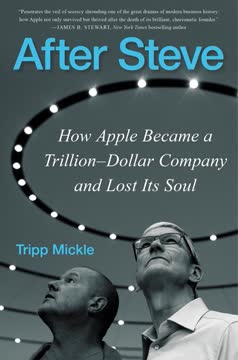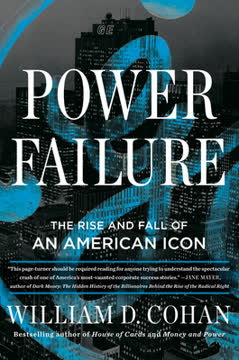Key Takeaways
1. Jack Welch transformed GE and corporate America with ruthless efficiency
"You have to get out of this rat race of quarterly reporting and quarterly behavior."
Management revolution. When Jack Welch became CEO of General Electric in 1981, he inherited a company that epitomized postwar American capitalism - stable, paternalistic, and focused on engineering excellence. Over the next two decades, Welch radically transformed GE into a lean, agile conglomerate obsessed with maximizing profits and shareholder returns.
Widespread influence. Welch's management philosophy, dubbed "Welchism," spread far beyond GE as other companies sought to emulate his success. His focus on efficiency, cost-cutting, and financial performance became the dominant paradigm in corporate America. Welch was named "Manager of the Century" by Fortune magazine and his methods were widely taught in business schools.
Mixed legacy. While Welch was lionized during his tenure for GE's soaring stock price and consistent earnings growth, the long-term consequences of his approach became apparent after his retirement. The relentless focus on short-term results came at the expense of innovation, employee welfare, and long-term sustainability. Welch's successors struggled to maintain GE's success, ultimately leading to the company's decline and breakup.
2. Welch prioritized shareholder value above all else, redefining corporate purpose
"The paramount duty of management and of boards of directors is to the corporation's stockholders."
Shareholder primacy. Welch embraced and popularized the idea that maximizing shareholder value should be the primary goal of corporations. This marked a significant shift from the stakeholder model that had prevailed in the postwar era, where companies balanced the interests of employees, customers, communities, and shareholders.
Financial focus. Under Welch, GE became fixated on meeting quarterly earnings targets and driving up the stock price. This often came at the expense of long-term investments in research and development, employee welfare, and community engagement.
- Welch famously declared that the company's goal was to be "#1 or #2" in every business it operated in, or exit that business
- He implemented aggressive stock buyback programs to boost share prices
- GE became known for consistently meeting or beating Wall Street's earnings expectations, often through creative accounting and financial engineering
3. GE's success under Welch was built on downsizing, dealmaking, and financialization
"Neutron Jack"
Mass layoffs. Welch earned the nickname "Neutron Jack" for his aggressive downsizing efforts, which eliminated hundreds of thousands of jobs at GE. He implemented a controversial "rank and yank" system that required managers to fire the bottom 10% of performers each year.
Constant dealmaking. GE under Welch became a machine for mergers and acquisitions, constantly buying and selling businesses to reshape the company's portfolio. This included major deals like the acquisition of RCA (which owned NBC) and the creation of GE Capital.
- GE made nearly 1,000 acquisitions during Welch's tenure
- The company also sold or closed hundreds of underperforming businesses
Financial engineering. Welch dramatically expanded GE Capital, turning the industrial conglomerate into a major financial services player. This allowed GE to smooth out earnings and engage in complex accounting maneuvers to meet Wall Street expectations.
- By the late 1990s, GE Capital accounted for nearly half of the company's profits
- The finance arm became so large and complex that it posed systemic risks to the broader economy
4. Welch's leadership style was confrontational and created a culture of fear
"Working for him is like a war. A lot of people get shot up; the survivors go on to the next battle."
Aggressive management. Welch was known for his confrontational and often abrasive leadership style. He cultivated a hyper-competitive corporate culture where managers were pitted against each other and constant fear of job loss was used as motivation.
Cult of personality. Welch became a larger-than-life figure both within GE and in the broader business world. His forceful personality and apparent success led many to view him as an oracle of management wisdom.
- Welch instituted a leadership training center called Crotonville, dubbed "Jack's Cathedral"
- He personally oversaw the development and promotion of top executives
- Welch's books and speaking engagements turned him into a management guru
5. GE Capital became a major profit center but introduced significant risks
"Since I had been involved in making things all my life, pounding and grinding it out to make a nickel, I couldn't believe how easy this 'appeared' to be."
Financial powerhouse. Under Welch, GE Capital grew from a small division that provided financing for GE products into a massive financial services operation. It engaged in a wide range of activities including commercial lending, insurance, and complex derivatives trading.
Hidden risks. The rapid growth and complexity of GE Capital introduced significant risks to the overall company. These risks were often obscured by opaque accounting and the division's ability to smooth out GE's earnings.
- GE Capital's assets grew from $11 billion in 1980 to over $370 billion by 2001
- The division's activities made GE vulnerable to financial crises, as became apparent in 2008
- Regulators eventually deemed GE Capital a "systemically important financial institution"
6. Welch's successors struggled to maintain GE's success and ultimately failed
"Following you has been no fun."
Impossible expectations. Jeff Immelt, who succeeded Welch as CEO in 2001, inherited a company with inflated expectations and hidden vulnerabilities. He struggled to maintain GE's stellar performance in a changing business environment.
Series of crises. GE faced multiple challenges under Immelt and subsequent CEOs, including:
- The impact of the 9/11 attacks on GE's aviation and insurance businesses
- The 2008 financial crisis, which exposed weaknesses in GE Capital
- Failed acquisitions and poor strategic decisions in the power and oil & gas sectors
Downfall and breakup. GE's stock price and reputation declined significantly in the years following Welch's retirement. In 2021, the company announced plans to break itself up into three separate companies, effectively ending GE's run as an industrial conglomerate.
7. Welch's management philosophy spread across corporate America
"Jack set the path. He saw the whole world. He was above the whole world. What he created at GE became the way companies now operate."
GE alumni network. Many executives who worked under Welch went on to lead other major companies, spreading his management philosophy across industries. This included leaders at companies like Boeing, Home Depot, and Chrysler.
Business education. Welch's approach became widely taught in business schools and management training programs. His books and speaking engagements further popularized his ideas.
Broader cultural impact. Welchism influenced how society viewed the role of corporations and executives. It contributed to:
- The rise of the "celebrity CEO"
- Increased focus on stock prices and quarterly earnings in media coverage
- Growing income inequality as executive compensation soared while worker wages stagnated
8. The negative consequences of Welchism became apparent over time
"Welchism has made America poorer, less equal, and more insecure."
Economic impacts. The spread of Welch's management philosophy contributed to broader economic trends including:
- Stagnant wages for workers
- Decline of manufacturing jobs in the United States
- Increased financialization of the economy
- Growing income inequality
Corporate scandals. The pressure to meet short-term financial targets led to accounting fraud and other ethical breaches at many companies, including Enron, WorldCom, and eventually GE itself.
Long-term costs. The focus on shareholder value and short-term results came at the expense of:
- Investment in research and development
- Employee training and development
- Corporate social responsibility initiatives
- Long-term strategic planning
9. Some companies and leaders are now rejecting Welch's approach
"If you want to maximize your shareholder return, it leads you automatically to a more responsible ESG, multi-stakeholder type business model."
Stakeholder capitalism. A growing number of business leaders and companies are embracing a more balanced approach that considers the interests of multiple stakeholders, not just shareholders. This includes:
- Unilever under Paul Polman, which stopped providing quarterly guidance and focused on sustainability
- PayPal under Dan Schulman, which raised wages and improved benefits for lower-paid workers
- The Business Roundtable's 2019 statement on the purpose of a corporation, which emphasized stakeholder interests
Long-term focus. Some companies are prioritizing long-term value creation over short-term results, including:
- Amazon's willingness to forgo profits for years to build market share
- Investments in renewable energy and sustainable business practices by companies like Patagonia
Worker empowerment. There are growing calls for increased worker representation on corporate boards and profit-sharing arrangements.
10. Moving beyond Welchism requires systemic changes and new priorities
"To create a new economy we will need a new framework for success."
Policy changes. Addressing the negative impacts of Welchism may require government action, including:
- Raising the minimum wage
- Strengthening antitrust enforcement
- Reforming corporate governance rules
- Changing tax policies to discourage short-term profit-taking
Corporate reform. Companies can take steps to rebalance their priorities, such as:
- Tying executive compensation to long-term performance metrics
- Investing more in employee training and development
- Considering environmental and social impacts in decision-making
- Increasing transparency in financial reporting
Cultural shift. Moving beyond Welchism also requires changing how society views the role of business and measures success. This includes:
- Redefining the purpose of corporations beyond profit maximization
- Celebrating business leaders who prioritize stakeholder interests
- Encouraging long-term thinking in investment and business strategy
Last updated:
FAQ
What's The Man Who Broke Capitalism about?
- Focus on Jack Welch: The book examines Jack Welch's tenure as CEO of General Electric and his significant impact on American capitalism.
- Critique of Shareholder Primacy: It critiques Welch's focus on maximizing shareholder value, which led to negative consequences for employees and communities.
- Legacy and Consequences: The book explores the long-term effects of Welch's strategies, including the decline of the middle class and corporate responsibility.
Why should I read The Man Who Broke Capitalism?
- Understanding Modern Capitalism: It provides insights into the evolution of corporate America and the roots of current economic challenges.
- Lessons from Leadership: Readers can learn from Welch's leadership style, understanding both its successes and societal harms.
- Relevance to Current Issues: The book addresses themes like corporate accountability and economic inequality, which are highly relevant today.
What are the key takeaways of The Man Who Broke Capitalism?
- Definition of Welchism: Welchism is a corporate philosophy prioritizing shareholder profits, often at the expense of employees and ethics.
- Impact of Downsizing: Welch's downsizing strategies altered employer-employee relationships, leading to job insecurity.
- Financialization of Corporations: Welch's focus on financial engineering over manufacturing has had lasting economic implications.
How did Jack Welch's leadership style influence corporate America?
- Shareholder Value Focus: Welch's emphasis on shareholder value became a guiding principle for many corporations.
- Aggressive Cost-Cutting: His tactics, including mass layoffs, were widely adopted, contributing to job insecurity.
- Competitive Corporate Culture: Welch fostered a cutthroat environment, leading to stress and insecurity among workers.
What is the "rank and yank" method described in The Man Who Broke Capitalism?
- Performance Evaluation System: This method involved ranking employees and firing the bottom 10 percent annually.
- Impact on Morale: It created a transactional view of work, leading to insecurity and reduced morale.
- Widespread Adoption: Many companies emulated this method, prioritizing profits over employee well-being.
How did Welch's approach to financialization affect GE?
- Shift to Finance: Welch transformed GE into a financial powerhouse, emphasizing financial engineering.
- Risks of Financialization: This shift introduced substantial risks, evident during the 2008 financial crisis.
- Long-Term Consequences: The focus on financialization led to a culture of short-termism, affecting stability.
What are the societal implications of Welchism as discussed in The Man Who Broke Capitalism?
- Erosion of the Middle Class: Welchism contributed to the decline of the middle class and growing economic inequality.
- Corporate Accountability Issues: The focus on shareholder value led to a lack of accountability and unethical practices.
- Impact on Worker Rights: Welch's strategies weakened labor unions and workers' rights, leading to a precarious workforce.
How did Welch's legacy continue to influence CEOs after his retirement?
- Continued Adoption of Welchism: Many CEOs continued to implement Welch's strategies, perpetuating cost-cutting and shareholder primacy.
- Challenges for Successors: Successors struggled to replicate Welch's success, facing backlash for aggressive tactics.
- Shift in Corporate Culture: Welch's legacy led to a culture prioritizing short-term gains over sustainability.
What are the criticisms of Welch's management style in The Man Who Broke Capitalism?
- Ruthlessness and Lack of Empathy: Welch's aggressive tactics fostered a toxic work environment and eroded loyalty.
- Short-Term Focus: His emphasis on immediate profits led to a lack of investment in innovation and growth.
- Ethical Concerns: The book highlights ethical issues, including earnings manipulation and prioritizing shareholder value over responsibility.
How does The Man Who Broke Capitalism connect Welch's practices to current economic issues?
- Income Inequality: Welch's focus on shareholder value is linked to growing income inequality, benefiting the wealthy.
- Corporate Accountability: The lack of accountability has led to public distrust of big business.
- Impact of COVID-19: The pandemic exposed worker vulnerabilities, underscoring the need for stakeholder capitalism.
What are some examples of companies that embody Welchism today?
- Amazon: The book discusses Amazon's focus on efficiency and profits, often at the expense of employee well-being.
- Boeing: Boeing's management decisions, prioritizing profits over safety, are presented as a consequence of Welchism.
- Kraft Heinz: The company's focus on cost-cutting and financialization has led to challenges like declining sales.
How does the author propose to move beyond Welchism?
- Adopting Stakeholder Capitalism: Gelles advocates for prioritizing the interests of all stakeholders, not just shareholders.
- Policy Changes: Systemic reforms like raising the minimum wage and capping executive compensation are necessary.
- Corporate Responsibility: Companies should focus on long-term growth and sustainability rather than short-term profits.
Review Summary
The Man Who Broke Capitalism receives mixed reviews, with some praising its critique of Jack Welch's destructive business practices and their lasting impact on corporate America. Critics appreciate the book's analysis of how Welch's focus on shareholder value and short-term profits led to widespread job losses and economic inequality. However, some reviewers find the book overly biased and lacking nuance, arguing that it oversimplifies complex economic trends. Despite these criticisms, many readers find the book enlightening and relevant to understanding current economic challenges.
Similar Books










Download PDF
Download EPUB
.epub digital book format is ideal for reading ebooks on phones, tablets, and e-readers.




